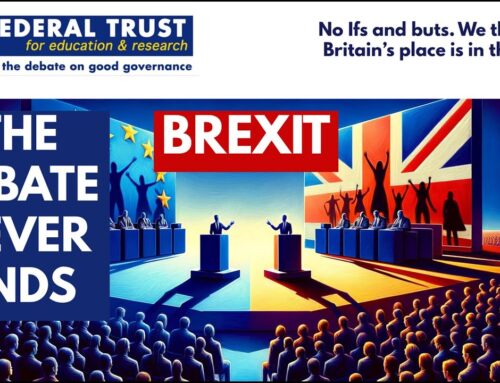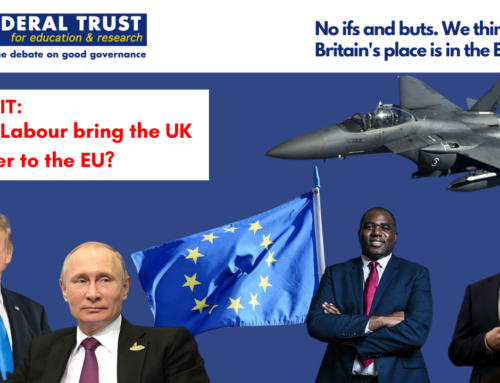This essay was commissioned by Léo Keller on behalf of the Blogazoi blog, as part of a collection to be published following the German election.
It is over 21 years since Angela Merkel took over from Wolfgang Schäuble as leader of the CDU, Germany’s most consistently successful political party. Schäuble, the heir apparent to the long-serving Helmut Kohl, fell through being linked to the financial scandal swirling around Kohl and the CDU. In that time, the woman patronisingly called das Mädchen [the girl] by Kohl when she was a junior minister in his government evolved to become leader of her party, then Federal Chancellor. Depending on how long the coalition negotiations take following the September 2021 general election, she could surpass Kohl to become the longest serving post-war Chancellor, with only Bismarck having served longer since Germany was established.
As she leaves the stage, Germany is the leading power in Europe, both politically and economically, though not so much so globally. Yet in 1999, Germany had been labelled by the Economist as the sick man of the euro, a play on the dubious title of ‘sick man of Europe’ previously held by the UK in the 1970s and (allegedly) originally bestowed by Czar Nicholas the 1st on the Ottoman empire. By 2005, the Economist had shifted the slur to Italy, but although the Schröder government in power up to then, after defeating Kohl in 1998, had made progress in dealing with some of the economy’s structural problems, most commentators would still have placed Germany low in the league table of European economies.
Much has already been written and much more will follow on Merkel’s political career, policies, achievements, failings and probable legacy. This essay looks at her primarily through the lens of the UK in Europe, noting that, among the G7 countries, Merkel is one of just three women to have served as head of government. The other two were to be found in Downing Street. Eagle-eyed readers may quibble that a scandal-ridden prime minister in France should be included, but in the French system, prime ministers are not elected but appointed by a powerful President who is the real head of government. Moreover, Ėdith Cresson’s tenure may have exceeded those of many of her predecessors in France’s third and fourth republics (when they changed almost with the seasons), but even so she lasted just 323 days.
Theresa May, who served while Merkel was in power (M&M, anyone?) had the misfortune to inherit the millstone of Brexit from her predecessor and presided – if that is the word, given her struggles to assert her authority – over a chaotic period in UK politics. Her much derided slogan, ‘Brexit means Brexit’, is not one that will echo down the years. By contrast, a place in history is assured for Margaret Thatcher, the third of the trio, although even today opinions are deeply divided on her time in government and her legacy. Some venerate her, others vilify her, but few would deny she made a difference.
One curiosity about Merkel and Thatcher is that both studied chemistry during their academic careers, the former obtaining a doctorate in physical chemistry, the latter as an undergraduate. In most other respects, however, they could scarcely be more different. Thatcher was strongly ideological and determined to impose her pro-market policies on a reluctant country. To achieve her goals, she had to disrupt the prevailing consensus, taking on not just her party’s opponents, but especially those in her own party she disparaged as ‘wets’. A phrase the Iron Lady (a name conferred on her by the Soviet press) revelled in, showing her single-mindedness, was ’the lady’s not for turning’.
By contrast, Merkel has been more of a consolidator, able to build on many of the reforms of the Schröder government and notable for her careful weighing of options before deciding how to proceed, sometimes to the frustration of those wanting her to act more rapidly and decisively. An exception, though, was her ‘Energiewende’ policy to transform the energy industry. Thatcher relished her fight with the coalminers and saw it as an essential part of her modernisation agenda, but many in Germany believe Merkel’s approach lacked coherence, especially her knee-jerk reaction in accelerating the closure of nuclear power generators in response to the Fukushima disaster in Japan. Her support for the second Nordstream pipeline, bringing gas from Russia directly to Germany, has also been divisive.
Nevertheless, Merkel was capable of bold and tough decisions, none more so than that of accepting Syrian refugees. Her phrase ‘wir schaffen das’ [we can cope], was low-key yet brooked no opposition. Theresa May, still Home Secretary at the time, was by then preparing legislation (enacted in 2016) to toughen her ‘hostile environment’ policy towards immigrants. Merkel’s robustness was also displayed in her determination to ensure the survival of the euro. If Thatcher was iron, Merkel often showed steel.
Like it or not, ‘Thatcherism’ is an identifiable policy paradigm and a benchmark against which her successors, including those from her own party, are judged. As for ‘Merkelism’: does it exist at all as an economic model? Certainly, the pursuit of the ‘schwarze Null’ [black zero, referring to the public sector deficit] and the ‘schuldenbremse’ [debt brake] enacted in 2009, aimed at rendering the public finances sustainable, were signature policies of her government. Their influence also affected German attitudes towards the lax fiscal policies elsewhere in Europe. What Emmanuel Macron called Germany’s ‘fétichisme perpétuel’ [perpetual fetish] for budget surpluses has caused undoubted tension in other Eurozone countries, lacking ‘fiscal space’ of their own to stimulate their economies. Nevertheless, Germany used fiscal measures effectively to counter the economic downturn in 2008/9 and again, on a much larger scale, in 2020/1.
On Europe, Thatcher became increasingly hostile and a line can be traced between her 1988 Bruges speech and the confluence of political forces responsible for Brexit. Merkel, on the other hand, could well be remembered as the woman whose steadiness kept the European Union together, cajoling her reluctant compatriots to keep Greece afloat, recognising the importance of sustaining the euro and leading the way in launching the Next Generation EU economic recovery package during the pandemic. She frequently commented that ‘if the euro fails, Europe fails’ (for example in addressing the Bundestag on the 19th of May 2010 – defending the first Greek bailout).
However, she might not welcome the knowledge that Yannis Varoufakis, Greek Finance Minister in the early days of the Syriza government, said much the same in a BBC political programme BBC (This Week) on 1st June 2018: ‘if the euro fails, the European Union is gone’. The difference was, though, that Varoufakis thought the euro would fail.
It is also clear from how she dealt with David Cameron in the run up to Brexit, then his successors in negotiating the UK’s withdrawal and the future EU-UK relationship, that for her, the integrity of the EU always came first. Time and again UK leaders deluded themselves into thinking that Germany would make others ‘see sense’. Thus, prior to the Brexit referendum, Cameron – apparently well-liked by Merkel – thought he could persuade her to support his plans for restrictions on free movement as part of his attempts to renegotiate the terms of UK membership of the EU. She emphatically would not and it is striking how quickly the limited concessions Cameron did obtain disappeared from public discourse during the referendum campaign.
When Theresa May endured the humiliation, at the October 2018 Salzburg meeting of the European Council, of having her carefully constructed ‘Chequers’ proposals dismissed, it was Donald Tusk and Emmanuel Macron who were seen to have been the leading perpetrators. But Angela Merkel made no obvious effort to support May and was even captured in a video published by the Express (one of the strongly eurosceptical UK news groups) apparently snubbing poor, isolated Theresa: no sisterly solidarity to be seen.
Nor did Boris Johnson fare any better. In the frantic final stages of negotiating the Trade and Cooperation Agreement, concluded on Christmas Eve 2020, Johnson once more hoped to persuade the big two of Merkel and Macron (M&M bis) to lean on the European Commission to make concessions. Macron may have relished being branded as the ‘hard cop’, but if it was correct to portray Merkel as the ‘soft cop’, the key point remains that both cops (the principle behind the metaphor, after all) wanted the same outcome. As before, the EU side stayed solid and united, and it was the UK that had to make the more extensive concessions. Much the same was seen when Johnson’s government woke up to the evident flaws in the Northern Ireland protocol it had, itself, proposed and struggled to find viable solutions.
The surprise in all this is that UK’s politicians – not to mention other stakeholders – should have been surprised at the German approach generally and Merkel’s in particular. A common trope illustrates the gap in comprehension. Both before the referendum and throughout the Brexit negotiations, it was often asserted that German industry, fretting about losing its lucrative British markets, would lean on Merkel to be more accommodative. BMW, in short, would plead the UK’s case and induce Merkel to support it. Not so: as Elmar Brok, a member of the European Parliament influential in the CDU and close to Merkel, explained succinctly in a speech at Cardiff University on 26th April 2018. Germany, he said, ‘will not; they will stick with the solidarity of the European Union and BMW has the same opinion’. He went on to assert ‘the integrity of the single market is more important for us than anything else. There should be no hope that Germany because of this industry or export interest will fall out of the solidarity of the European Union’.
The many misjudgements by UK elites about how Germany would align itself and whether Merkel would shift the EU stance in Britain’s favour are not that hard to explain. They derive from a misunderstanding of Germany’s interests. Certainly, export markets matter greatly, but the more powerful and enduring German interest lies in successful cooperation within the framework of the European Union. It is not, nor was it ever, about domination: those in Greece who created images of her sporting a Hitler moustache or in the UK who liken her to a nazi stormtrooper are so wide of the mark it is embarrassing.
Whether it is defending the euro during the sovereign debt crisis, resisting calls for restrictions on free movement, offering leadership in the refugee crisis or pushing for the pandemic recovery package, Merkel has been consistent, maybe too cautious at times, yet bold when necessary. She may on occasion, an accusation levelled at Barack Obama, have ‘led from behind’, but she will be seen to have coped well with challenges ranging from populism to the pandemic. In some respects, such as neglect of infrastructure investment, tax reform and modernisation of the German economy, her record is open to the criticism that she managed Germany well in the present, but has done too little to provide for the future. She can, too, be accused of mismanaging her succession, but anyone in the UK betting that one or other of the Chancellor-candidates in the forthcoming election will usher in a more pro-UK Germany is likely to be disappointed; instead, expect continuity.
Europe will miss her measured authority.
Photo copyright: European Union 2021
Angela Merkel at the European summit, June 2021






A thoughtful and balanced piece. However, for me it lacked a reflection on her personal qualities, and empathy. We have a buffoon running the UK no could say her personal qualities were anything but impressive. She has done so much for the promotion and concept of the ‘woman leader’-no-one could Thatcher of that!